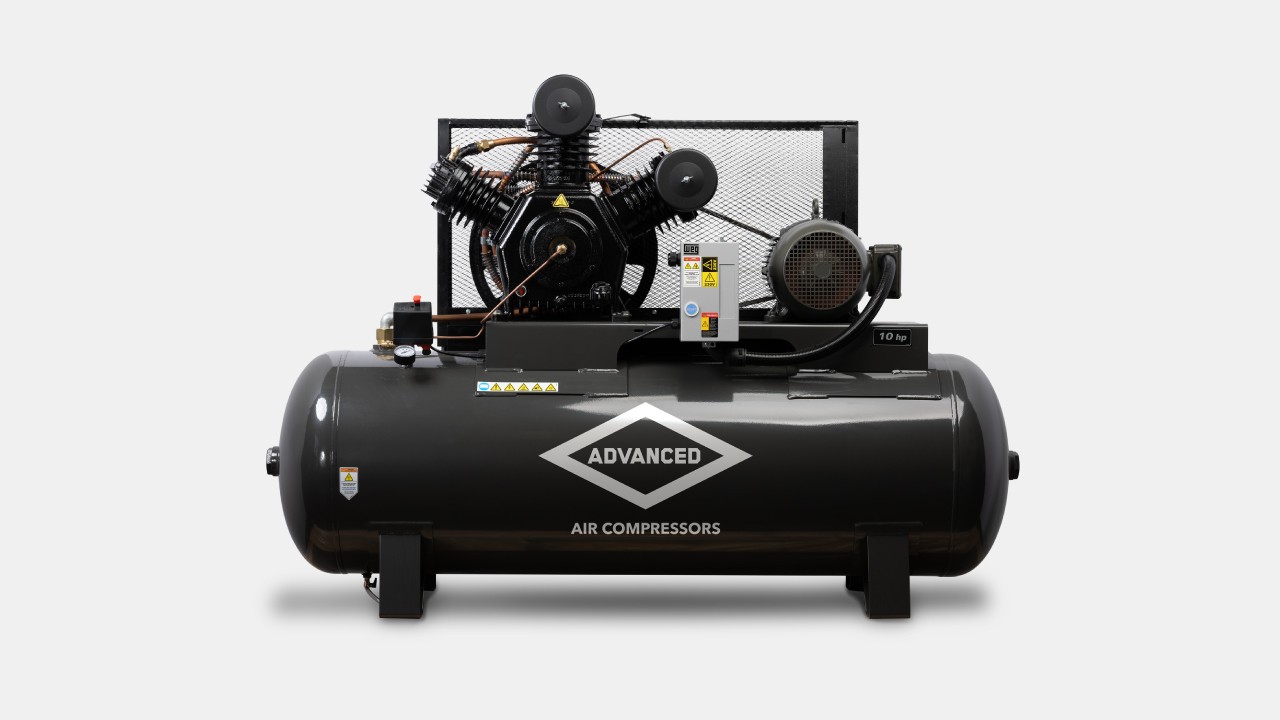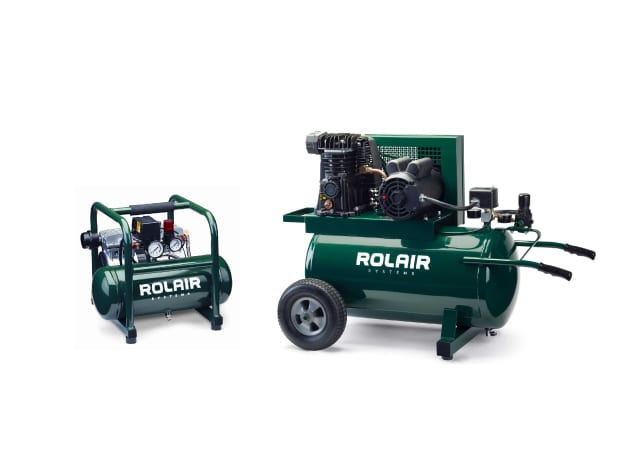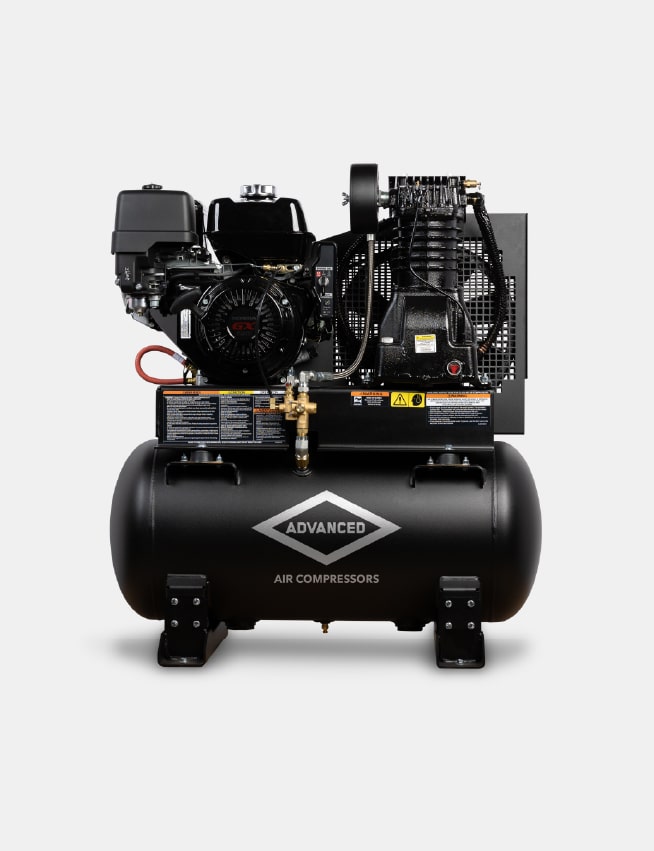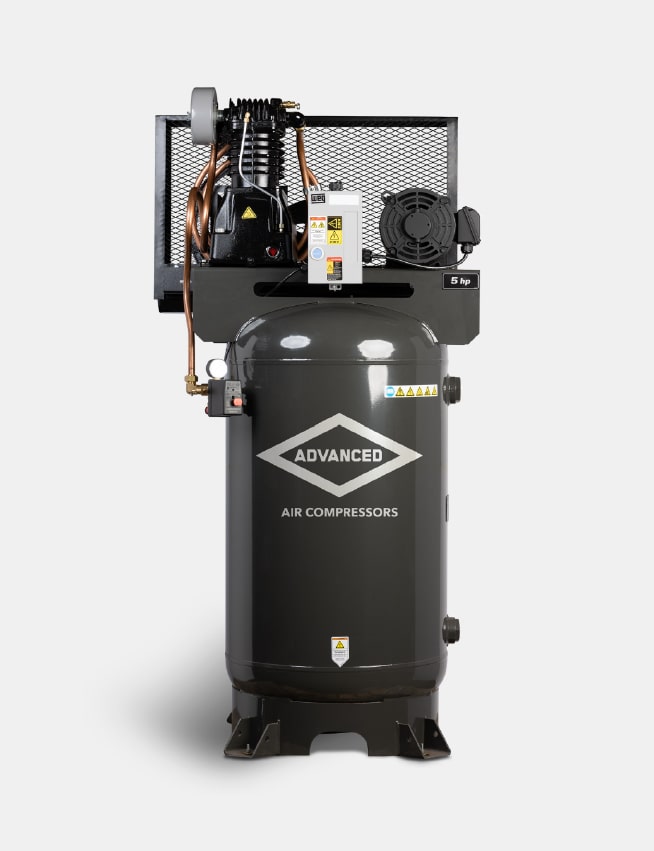Whether you’re taking over a body shop business with an existing air compressor that doesn’t seem to be keeping up enough or looking to purchase your first compressed air tool system and need to know the basics, there’s no doubt that auto body work requires a particular set of equipment and technology that go beyond that of normal pneumatic tools. But what tools will you need to run from your air tank? What do you need to take into consideration in your compressed air system? Are you a small shop that can run on an air hose or two from your main tank without lowering air pressure or air volume too much, like a regular automotive shop with a digital tire inflator or a home garage running an impact wrench? Or will you be painting car after car with a spray gun?
Finding the best air compressor for body shop work can seem like a difficult process, but it doesn’t have to be. In this post, we’ll explain what you need the air compressor for in your body shop, what you need to consider when purchasing an industrial air compressor, and which air compressor is right for your needs.
Why Do You Need an Air Compressor in a Body Shop?

Let’s start by looking at all the things you can use an air compressor for in a body shop. There are a ton of air tool applications, including an impact wrench for loosening lug nuts on tires, a spray gun for painting vehicles once repairs have been made, digital tire inflator tools for bringing tires back up to pressure, and grinders, ratchets, sanders, and more. In fact, the number of air tools used in an auto body shop can be overwhelming, which is why you’ll want to go beyond a simple portable air compressor and look into a quality industrial or commercial air compressor that can keep up with your shop’s demands.
What to Consider when Purchasing an Air Compressor

Size
While it’s easy to assume that you need a certain gallon air compressor to keep up with your needs, you should go beyond that point when calculating the size of air compressor for your auto body shop. How many spray guns will you be running at a time, and how much air volume and air pressure will they need to operate successfully? Spray painting will likely take up the bulk of your size needs, but you’ll still need to calculate for other air tools, including impact wrenches, tire inflators, grinders and sanders. Once you’ve estimated your total maximum air volume and pressure needed at a time, make sure to add an in an extra margin to allow for future growth of your business or for extreme circumstances.
Type
Should you go with a piston compressor or a rotary screw compressor for your operation? The first thing to bear in mind is the duty cycle. Most piston compressor systems are designed to have a 60-70% duty cycle, which means you’ll need to intentionally “oversize” your system to prevent the compressor from burning out over time. By comparison, a rotary screw compressor can be smaller in size, as its duty cycle is closer to 100%, if not at 100%. This means that rotary screw compressors can run all the time without causing problems to your overall system longevity.
Pressure & Volume
How much air pressure and air volume do your tools need? Some tools, such as truck jacks, will require pressures up to 165 PSI, but only for a short period of time. By comparison, your spray guns may only require between 30-60 PSI, but at a much longer volume as they run for extended periods of time. Take the time to determine both figures, then if you choose to go with a piston compressor, consider that you’ll probably need to increase the tank capacity by 40-50% to prevent the compressor from running longer than it should. Another aspect to consider is an air filter in line, especially for the painting process, as moisture or oil in your paint can cause flaws in the final work.
Placement
Once you’ve selected an air compressor, consider where you’re going to place it in or near your shop. Because of the amount of noise that it can produce, many businesses choose to locate the compressor in a separate room or structure with compressed air piping run to the shop. No matter where you house your new air compressor, however, you’ll want to make sure there’s at least 36″ of space on each side around it. This allows you to move around the air compressor if you need to troubleshoot it, provide maintenance or similar issues. You’ll also want good ventilation so that the air heated up by the compressor can move freely out of the structure, so the compressor stays cool and prevents overheating. Generally speaking, you’ll want to be able to keep the air temperature in the location below 104ºF, because above that temperature, overheating can damage the air compressor.
So, what is right for me?

Let’s take a look at several types of air compressors that will provide you with decent results, depending on your shop size and overall needs.
Home Garage
For the smaller needs of the hobbyist, the Quincy Q12120P is a portable 20-gallon horizontal air compressor that is capable of reaching up to 135 PSI and up to 7.4 cubic feet per minute, allowing it to run a single spray gun and any number of air tools. Powered off of 115 volts and a two-horse motor, the additional tank capacity provides you with a smoother operation with a spray gun.
It features an aluminum head with a special fin design to encourage heat dissipation, while the fully-enclosed belt guard protects both your fingers and the belt. With the two-horsepower motor, it is recommended that the compressor be wired into a 40-amp circuit, to reduce breaker throws. Although it weighs in at 155 pounds, it only takes up a svelte 35″ by 20″ by 32″ space, making it easy to move it out of the way when you don’t need to use it. Currently priced at $1275 puts it in the range of most serious hobbyists.
Small Shop
If you’re operating a small shop, stepping up to the Quincy QT-54 gives you a 60-gallon vertical air compressor and makes it much easier to run a spray gun along with other tools at the same time. Reaching pressures up to 175 PSI and up to 15.4 cubic feet per minute, the 5 HP Baldor motor with overload is operated on a 230 volt single-phase circuit.
As a two-stage air compressor, it’s designed with a 100% duty cycle, so you can keep it running continuously during busy times, making it easier to keep up with your workload. The two-phase compressor system runs at lower RPMs, keeping it cooler, while providing more efficiency out of every stroke. It’s currently priced at $2,925, making it well within reach of the average small shop while delivering superior results.
Large Shop
For a large shop, you need a serious air compressor that can keep up with your workload, and Advanced Air’s 10-HP Horizontal Air Compressor fits the bill perfectly. With an outstanding 120 gallons of capacity that is capable of reaching up to 175 PSI and delivering 32 cubic feet per minute, you’ll be able to operate at least a couple of spray guns as well as multiple other air tools with this compressor.
Designed to work on either single-phase 230 volt or three-phase 230 volt or 460 volt, it’s available in a range of power options, making it easier to adapt to your shop’s needs. The cast-iron construction and a three-piston, low-RPM design helps it run cooler and quieter, incorporating a Weg industrial motor for superior performance. Magnetic starters are mounted and wired for easier operation, and a two-year pump warranty is included. It’s competitively priced at $6,150 for the single-phase version.
The Advanced Air Difference

Buying an air compressor for your auto body shop goes beyond simply picking up the best model and driving it away. When you work with Advanced Air & Vacuum, you also receive expert advice from individuals who have been in the industry for more than 20 years. Advanced Air’s expert team can help you troubleshoot any issues, perform repairs, or provide rentals. Contact us today for a smart start to your auto body shop.

